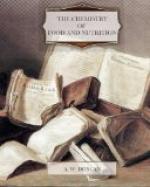(c) See “A Text Book of Physiology,” by M. Foster, 5th edition, part ii., p. 839; the diet was bread, fruit and oil. The man was in apparently good health and stationary weight; only 59 per cent. of the proteids were digested, leaving the small quantity of 32 grammes available for real use. In commenting upon this, Professor Foster writes:—“We cannot authoritatively say that such a reduction is necessarily an evil; for our knowledge will not at present permit us to make an authoritative exact statement as to the extent to which the proteid may be reduced without disadvantage to the body, when accompanied by adequate provision of the other elements of food; and this statement holds good whether the body be undertaking a small or large amount of labour.”
(d) The Miller of Billericay’s case is quoted by Dr. Carpenter, and also by Dr. Pavy. It was reported to the College of Physicians in 1767 by Sir George Baker. A remarkable degree of vigour is said to have been sustained for upwards of eighteen years on no other nutriment than 16 oz. of flour, made into a pudding with water, no other liquid of any kind being taken.
A striking instance of abstemiousness is that of Cornaro, a Venetian nobleman, who died in the year 1566 at the age of 98. Up to the age of 40 he spent a life of indulgence, eating and drinking to excess. At this time, having been endowed with a feeble constitution, he was suffering from dyspepsia, gout, and an almost continual slow fever, with an intolerable thirst continually hanging upon him. The skill of the best physicians of Italy was unavailing. At length he completely changed his habits of diet, and made a complete recovery. At the age of 83 he wrote a treatise on a “Sure and certain method of attaining a long and healthful life.” He says, what with bread, meat, the yolk of an egg and soup, I ate as much as weighed 12 ozs., neither more nor less. I drank 14 oz. of wine. When 78 he was persuaded to increase his food by the addition of 2 oz. per day, and this nearly proved fatal. He writes that, instead of old age being one of weakness, infirmity and misery, I find myself to be in the most pleasant and delightful stage of life. At 83 I am always merry, maintaining a happy peace in my own mind. A sober life has preserved me in that sprightliness of thought and gaiety of humour. My teeth are all as sound as in my youth. He was able to take moderate exercise in riding and walking at that age. He was very passionate and hasty in his youth. He wrote other treatises up to the age of 95.
Kumagara, Lapicque and Breis-acher, have, as the result of their experiments, reduced the quantity of proteid required per 24 hours to 45 grammes. T. Hirschfeld states, as the conclusion of his research, that it is possible for a healthy man (in one case for 15 days and in another for 10 days) to maintain nitrogenous balance on from 30 to 40 grammes of proteid per day. Labbe and Morchoisne (Comptes Rendus, 30th May, 1904,




